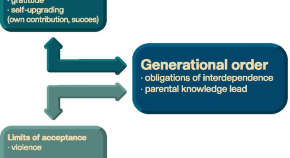Being a (Female) Child in Baku: Social Order and Understandings of Well-Being
Authors (first, second and last of 5)

Collection
This special section came about at the suggestion of Christine Hunner-Kreisel following the 2019 ISCI conference in Tarta, Estonia. Christine played a decisive role in moving it forward until almost its completion. Sadly, Christine Hunner-Kreisel passed away early 2022. Co-guest-editors Doris Bühler-Niederberger and Aysel Sultan finished the remaining work.
Contributions in this special section deal with growing up in two post-Soviet states – Azerbaijan and Kyrgyzstan. Each contribution has a different priority on the variety of forces that shape the wellbeing of children and youth as structured in the interaction between the efforts and abilities of their families, the state, as well as social and health policies in both national and cross-national contexts. In this special section, we understand infrastructure as places and institutions for day-care, education, leisure, social and health services. The papers identify barriers that children and young people encounter as they attempt to realize their potential and wishes in a variety of social, educational, and health contexts. These obstacles have something in common: they are rooted in a deficit of public and social infrastructure that is evident in these two states.
Table of Contents
Foundations of well-being in children’s and youth’s everyday lives in Azerbaijan and Kyrgyzstan
Being a (Female) Child in Baku: Social Order and Understandings of Well-Being
‘What’s the Problem Represented to Be?’ The Place and Wellbeing of Young People in Azerbaijan’s Drug Policy
When the Family Occupies the Future – Self-Processes and Well-Being of Kyrgyz Children and Young People
Competing Discourses in the Child Protection System in Kyrgyzstan: Implications for Redressing Gender Violence Against Girls
Construction of Girls’ Educational Projects in Kyrgyzstan from the Intergenerational Perspective
Christine Hunner-Kreisel had a Professorship with the denomination Transculturality and Gender and was working at the University of Vechta in the Department of Social Work. Her research focus was on educational transition processes, on processes of inclusion and exclusion in schools, on transnational migration (with a main focus on the post-soviet country Azerbaijan), on intersectionality and on concepts of children’s well-being and social inequality; finally on experiences of racism and discrimination of children and youth identifying as Muslim in Germany.
Dr. Doris Bühler-Niederberger is Senior Professor at the University of Wuppertal. "I am interested in age as a social structural dimension and in definitions of age categories in different societies. What characteristics, rights, values and mutual obligations are attributed to members of societies at different age stages? For this overarching interest, I compile the insights from empirical studies as I have conducted and currently conduct them in different countries and on different age groups, mainly on children, adolescents and young adults."
Dr. Aysel Sultan has a background in the sociology of health and illness and educational sciences with a particular interest in the application of Science and Technology Studies (STS) in public health and healthcare policies. After studying psychology at Baku State University (BSc; 2006-2010) and social work at Vytautas Magnus University (MA; 2010-2013), she defended her doctoral thesis in 2019 at the Goethe University Frankfurt (PhD; 2016-2019) at the Department of Educational Sciences in which she explored the socio-material aspects of recovery from drug use among young people.

